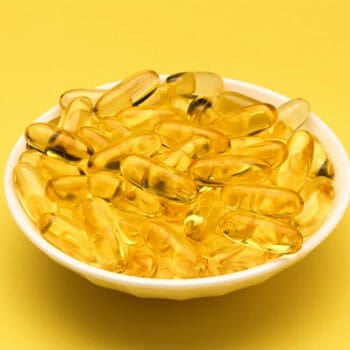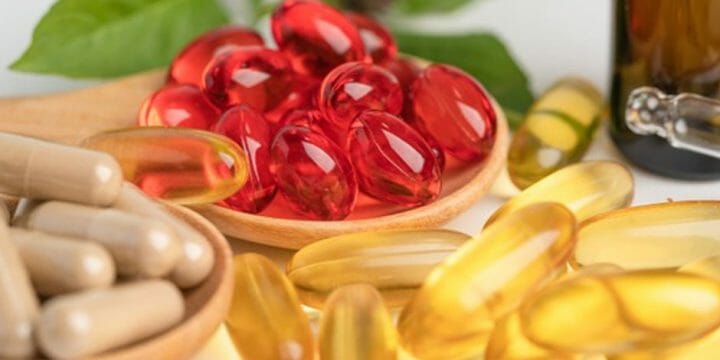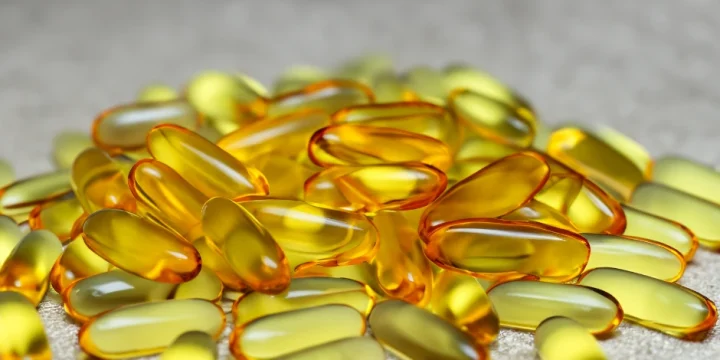Fish oil is one of the most popularly recommended supplements for the diet. Many of us who take adequate servings of oily fish per week know that omega-3 fatty acids may boost our overall well-being.
In addition, some doctors advise taking fish oil while pregnant, as it also supports normal pregnancy and healthy childbirth.
But is it safe? Drawing from my extensive clinical experience and ongoing research in maternal health, I've consulted with leading nutritionists and OB-Gyns to provide a comprehensive answer.
Here’s everything you need to know.
Quick Summary
Are Fish Oil Supplements Safe for Pregnant Women?

Fish oil supplements, high in the omega-3 fatty acids docosahexaenoic (DHA) and eicosapentaenoic (EPA), are safe and beneficial throughout pregnancy.
In my experience, ensuring adequate DHA intake (at least 200 mg), crucial for fetal brain and eye development in the third trimester is paramount [1].
Similarly, EPA plays a vital role in building structural cells and preventing maternal inflammation, necessitating at least 220 mg daily, as per the World Association of Perinatal Medicine [2].
However, those on a standard American diet might need supplements.
Considering the concerns about mercury in fish oil and seafood during pregnancy, I always advise my patients to opt for low-mercury products and mercury-safe supplements, a practice I've upheld throughout my career.
Always follow your doctor's advice on fish oil options and dosage during pregnancy.
What Types of Fish Oil Supplement are Safe During Pregnancy?
Check out the best Omega-3 supplements out on the market.
Benefits in Pregnant and Lactating Women

DHA and EPA are known to:
- Suppress placental inflammations that cause miscarriages
- Reduce preterm labor and delivery rates.
- Lower the risk of preeclampsia (as stated in the American Pregnancy's guidelines) [5].
Based on my observations in clinical practice, regular intake of oily fish or fish oil supplements by pregnant women may not only increase birth weight but also potentially prevent postpartum depression.
From my clinical experience, I have found that, unlike other anti-inflammatory options that are not recommended during pregnancy, omega-3 fatty acids stand out as both safe and effective.
Nursing mothers pass on DHA through breastmilk, so a DHA-rich diet or supplements are important for supporting child growth post-pregnancy.
Benefits in Fetal Development and Child Growth
Adequate EPA and DHA levels from Omega 3 long-chain polyunsaturated fatty acids function to:
- Help your baby sleep better inside your womb
- Boost the fetal neurodevelopment that comprises your baby's brain and vision
"In utero exposure can have a profound effect on the fetus that lasts through childhood."
- Dr. Jennifer Wu (Ob-Gyne at Lenox Hill Hospital, NYC)
Moreover, children whose mothers took fish oil supplements during pregnancy have higher bone mineral content. They also show a proportional increase in fat mass and an increase in lean mass.
In my professional experience, I've noted that omega-3 fats are not just beneficial for pregnant women; they are essential for everyone in producing prostaglandins, crucial for regulating vital functions like blood pressure and clotting.
Omega-3s also positively impact the central nervous system, eyes, brain, and heart by maintaining nerve cell membranes, protecting vision, and promoting healthy brain cells.
Risks and Side Effects of Taking Fish Oil

There's no evidence that fish oil negatively affects baby growth during or after pregnancy. However, consuming over 3 grams daily can pose health risks.
Exceeding recommended fish oil doses may hinder fetal development.
Research in the Neurotoxicology and Teratology journal indicates that both deficient and excessive intake can lead to shortened lifespans, neural degeneration, and other disorders in adulthood [6].
Other minor side effects include:
- Bad breath. Some people have the impression of having bad breath due to the smell of fish where the oil is extracted.
- Upset stomach. Due to large amounts of fat content, stomach discomfort is observed primarily in people with acid reflux.
- Diarrhea. Along with other digestive symptoms, taking fish oil supplements is also associated with loose stools.
- Vomiting. Some people might feel sick due to gastrointestinal problems, which lead to vomiting.
- Skin rash. People with allergic reactions to seafood might experience skin rashes during fish oil supplementation.
Other Sources of Omega 3 Fatty Acids

1. Cod Liver Oil
A teaspoon typically has 890 mg of omega-3s, but it's high in Vitamin A and D, making it less suitable during pregnancy due to potential health risks for the baby.
2. Non-Fish Omega 3 Supplements
For those with dietary restrictions, there are non-fish supplements available that offer high levels of EPA and DHA.
3. Fortified Foods
Omega-3s are added to dairy products like eggs, margarine, milk, and yogurt and are also found in juice and grains, including bread, cereals, oats, and pasta.
4. Enriched Products
Some products are enhanced with omega-3 fatty acids, such as vitamins, protein powders, quality meal replacement bars, and other weight loss products.
5. Natural Dietary Sources
Besides supplements, omega-3s come from nuts (walnuts), seeds (chia seeds, hemp seeds, and flaxseed), oils, and fatty fish.
When pregnant, it's crucial to pick low-mercury seafood options like salmon, anchovies, herring, and sardines, steering clear of high-mercury fish like shark and swordfish for both safety and nutrition.
References:
- https://www.ncbi.nlm.nih.gov/pmc/articles/PMC2621042/
- https://www.researchgate.net/figure/EPA-and-DHA-worldwide-recommendations-for-pregnant-and-lactating-women_tbl1_324084616
- https://efsa.onlinelibrary.wiley.com/doi/abs/10.2903/j.efsa.2012.2815
- https://ods.od.nih.gov/factsheets/Omega3FattyAcids-HealthProfessional/
- https://americanpregnancy.org/healthy-pregnancy/pregnancy-health-wellness/omega-3-fish-oil-and-pregnancy/
- https://www.ncbi.nlm.nih.gov/pmc/articles/PMC2839050/
About The Author
You May Also Like






